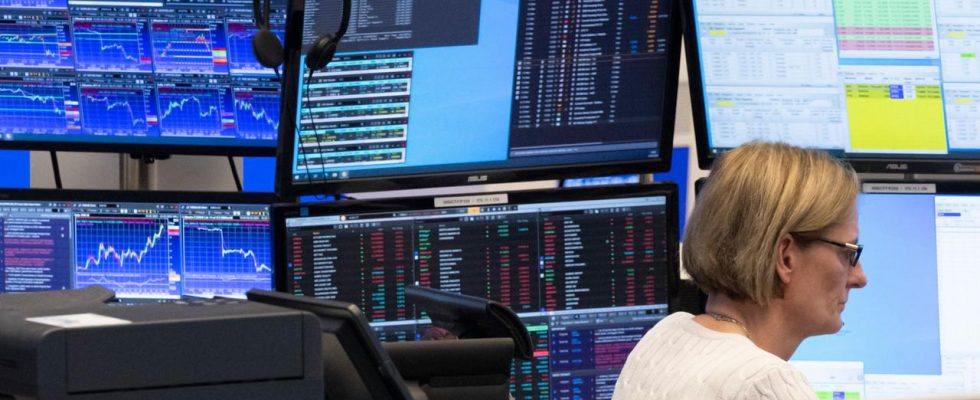market report
Even today, the DAX has not managed to turn around. Weak economic data and the US debt dispute continue to force investors to exercise caution. In winter, Germany slipped into a recession.
After three days of losses in a row, the DAX is still unable to break free. It is currently slightly below the level of the previous day. Yesterday, the leading German index fell by 1.9 percent to 15,842.13 points. This means that the strong price gains of the previous week with a record high of 16,331 points have been completely consumed and the DAX, as market expert Thomas Altmann from asset manager QC Partners stated, is “back in its old trading range”.
The slide below the 16,000 mark would have made the technical picture cloudier, commented the experts at Helaba. “Further setbacks cannot be ruled out, especially if the impasse in US government finances continues.”
Above all, the US debt dispute is costing investors more and more nerves. And there is no improvement in sight: According to the Republican negotiator Kevin McCarthy, there is still a lot to be discussed. “There are a number of points where we are still far apart,” McCarthy said yesterday.
“The negotiations about the US debt limit are coming to a head. The market reactions are likely to increase with the duration and intensity of the negotiations. A failure would result in serious market distortions worldwide, but even after an agreement an immediate transition to the agenda is by no means certain,” comments Ulrich Stephan , chief investment strategist for private and corporate clients at Deutsche Bank.
Bad news is also coming from the economic side: the German economy slipped into recession in the winter. The gross domestic product (GDP) shrank by 0.3 percent in the first quarter compared to the previous quarter, as reported by the Federal Statistical Office. In an initial estimate, the authorities still assumed that economic output would stagnate at the beginning of the year. “After GDP had already slipped into the red at the end of 2022, the German economy recorded two negative quarters in a row,” said Ruth Brand, President of the Authority.
In addition, according to a survey by the Ifo Institute, sentiment in the German export industry has fallen to its lowest level since November 2022. “The global interest rate hikes are slowly having an impact on demand,” explained Klaus Wohlrabe, head of the ifo surveys.
The debt dispute is also still a burden in the USA: the Dow Jones closed yesterday 0.8 percent lower at 32,799 points. The market-wide S&P 500 lost 0.7 percent to 4115 points. The tech-heavy Nasdaq 100 fell 0.50 percent to 13,604 points.
The dispute is now even threatening the creditworthiness of the United States. The rating agency Fitch takes a somewhat more critical view of the creditworthiness of the world’s largest economy and signaled a possible downgrade yesterday. The credit watchdog kept the top AAA rating, but downgraded the credit outlook to negative, which could mean a downgrade.
Furthermore, there is no clear monetary policy course in the US Federal Reserve. With a view to the future direction, some central bankers are in principle open to further interest rate hikes, while others are more opposed to additional tightening. This emerges from the minutes of the most recent interest rate meeting in early May that were published yesterday.
In Tokyo, the Nikkei index, which comprises 225 stocks, was up 0.4 percent at 30,800 points. The broader Topix index, on the other hand, lost 0.3 percent.
In China, the Shanghai stock exchange was down 0.9 percent, the index of the most important companies in Shanghai and Shenzhen fell 0.8 percent. The Hang Seng Index in Hong Kong fell particularly sharply with a discount of 2.5 percent. In addition to the US debt dispute, the recently intensified tone in the trade dispute between the USA and China caused a bad mood.
The euro continued to weaken on Thursday. In the morning, the common currency cost a low of 1.0733 US dollars, the lowest it was two months ago. The European Central Bank (ECB) set the reference rate slightly higher at $1.0785 on Wednesday afternoon.
The ailing real estate investor Adler Group posted a loss in the first quarter. From January to March, the bottom line was a minus of 55 million euros, in the previous year the loss was 10 million euros. Due to the sale of apartment packages, the operating income shrank to 16 million euros from 30 million euros a year ago. “Our core portfolio remains robust,” it said in a statement. According to its own information, the Adler Group still has around 26,000 apartments and intends to concentrate primarily on real estate in Berlin as part of its conversion in the future.
Nvidia has predicted sales for the current quarter well above expert expectations. The US chip manufacturer promised around eleven billion dollars. From refinitive surveyed analysts expect against it 7.15 billion dollar. In the past quarter, sales of $7.2 billion were above the forecast of $6.5 billion. Net income rose to just over $2 billion compared to $1.62 billion a year earlier. The increasing demand for artificial intelligence is driving demand for Nvidia’s chips.

